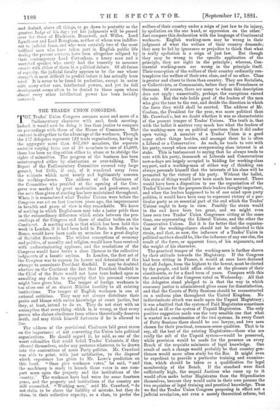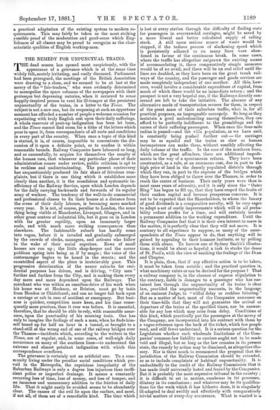THE TRADES' UNION CONGRESS.
THE Trades' Union Congress assumes more and more of a Parliamentary character with each fresh meeting. Indeed, it would now be doing it less than justice to compare its proceedings with those of the House of Commons. The contrast is altogether to the advantage of the workmen. Though the 157 delegates represent 122 trade organisations, having in the aggregate more than 467,689 members, the separate societies varying from one of 30 members to one of 45,000, there has been no disposition either to abuse or to abridge the -rights of minorities. The progress of the business has been uninterrupted either by obstruction or over-talking. The Report of the Parliamentary Committee covered very large ground, but little, if any, of it wandered away from the subjects which most nearly and legitimately concern the working-classes. The address of the Chairman of the Committee who presided at the opening of the Con- gress was marked by great moderation and good-sense, and the note thus given at starting has been maintained throughout. When it is remembered what Trades' Unions were before the -Congress was set on foot fourteen years ago, the improvement in breadth and grasp of view is very remarkable. We know of nothing in which Englishmen may take a juster pride than in the extraordinary difference which exists between the pro- ceedings of the Congress and those of similar bodies on the 'Continent. A meeting such as that which has been held this week in London, if it had been held in Paris, in Berlin, or in Rome, would have been made an occasion for a great display -of Socialist fireworks. The wildest conceptions of economy and politics, of morality and religion, would have been received with undiscriminating applause and the resolutions of the -Congress would have borne a Close likeness to the collective judgments of a lunatic asylum. In London, the first act of the Congress was to express its horror and detestation of the attempt to assassinate President Garfield. It may be doubted whether on the Continent the fact that President Garfield is -the Chief of the State would not have been looked upon as annulling any claim to sympathy that his personal virtues might have given him. The temper of foreign workmen is too often one of an almost Nihilist hostility to all existing institutions. The temper of English workmen is one of rational criticism. They may not always distribute their praise and blame with entire knowledge or exact justice but
a they, at least, intend to do so. They do not start with an assumption that everything which is, is wrong, or that every person who claims obedience from others theoretically deserves -death, and may think himself fortunate if he is allowed to live.
The address of the provisional Chairman laid great stress -on the importance of not converting the Union into political organisations. He should regard it, he said, as one of the worst calamities that could befall Trades' Unionists, if they allowed themselves, under any pretence whatever, to be drawn into the contentions of mere Party politics. Mr. Crawford was able to point, with just satisfaction, to the disproof -which experience has given to Mr. Lowe's prediction on this head. "Once give workmen votes," he said, "and the machinery is ready to launch those votes in one com- pact mass upon the property and the institutions of the country." The workman have had votes for some fourteen years, and the property and institutions of the country are still unassailed. "Working men," said Mr. Crawford, "do not claim to be above the liability of mistake, but they do -claim, in their collective capacity, as a class, to prefer the welfare of their country under a reign of just law to its injury, by spoliation on the one hand, or oppression on the other." Just compare this declaration with the language of Continental workmen. English working-men may be wrong in their judgment of what the welfare of their country demands; they may be led by ignorance or prejudice to think that what is really spoliation is a reign of just law. But though they may be wrong in the specific application of the principle, they are right in the principle ; whereas, Con- tinental working-men are wrong in the principle itself. Their conception of the welfare of their country ordinarily con- templates the welfare of their own class, and of no other. Class is greater and closer to them than country. They are Socialists, or Collectivists, or Communists, before they are Frenchmen or Germans. Of course, there are many to whom this description does not apply ; numerically, perhaps, the exceptions exceed the rule. But the rule holds good of the leaders of the men who give the tone to the rest, and decide the direction in which the force they wield shall be exerted. The address of Mr. Coulson, the President for the year, was more political than Mr. Crawford's, but we doubt whether it was so characteristic of the present temper of Trades' Unions. The truth is, that with the ballot it matters very much less what the leaders of the working-men say on political questions than it did under open voting. A member of a Trades' Union is a good many other things besides, and amongst these he is often a Liberal or a Conservative. As such, he tends to vote with his party, except when some overpowering class interest is at stake. This is tantamount to saying that he always tends to vote with his party, inasmuch as Liberals and Conservatives now-a-days are largely occupied in bidding for working-class sur port, and a working-man of either way cf thinking can always persuade himself that the interests of his class will be promoted by the victory of his party. Without the ballot, this state of things would have been much less assured. There would have been a disposition to use the organisation of the Trades' Unions for the purposes their leaders thought important, and when the leaders happened to be of one mind upon party politics, it would have been easy to represent victory of a par- ticular party as an essential part of the end which the Trades' Unions ought to keep in view. Possibly the strain would in the end have been too great, and we might even have seen two Trades' Union Congresses sitting at the same time, one representing the Liberal Unions, and the other the Conservative Unions. But it is far better that the organisa- tion of the working-classes should not be subjected to this strain, and that, as now, the influence of a Trades' Union in political matters should be, like the influence of any one else, the result of the force, or apparent force, of his arguments, and the weight of his character.
The practical temper of the working-men is further shown by their attitude towards the Magistracy. If the Congress had been sitting in France, it would at once have declared that all Judges, from the highest to the lowest, must be elected by the people, and hold office either at the pleasure of their constituents, or for a fixed term of years. Compare with this the resolution of the Congress voted on Wednesday. All that the delegates stand pledged to is that the way in which summary justice is administered gives cause for dissatisfaction, and that the Courts of Petty Sessions should be reconstructed on a uniform plan throughout the United Kingdom. No indiscriminate attack was made upon the Unpaid Magistracy ; it was admitted that the system of Paid Magistrates sometimes worked as ill as the system of Unpaid Magistrates. The only positive suggestion made was the very sensible one that what is wanted is a combination of the two systems. In every Court of Petty Sessions there should be one lawyer, and two men chosen for their practical, common-sense qualities. That is to say, all the best of the existing Magistrates—those who are really the salt of the Unpaid system—would be preserved, while provision would be made for the presence on every Bench of the requisite minimum of legal knowledge. One result of such a change would probably be that country gen- tlemen would more often study for the Bar. It might even be expedient to provide a particular training and examina- tion, which should be taken as a qualification for legal membership of the Bench. If the standard were fixed sufficiently high, the unpaid Justices who came. up to it would often make better Magistrates than the Stipendiaries themselves, because they would unite in their own persons the two requisites of legal training and practical knowledge. Thus we find the Trades' Union Congress proposing in effect not a judicial revolution, not even a merely theoretical reform, but a practical adaptation of the existing system to modern re- quirements. This may fairly be taken as the most striking possible proof of the moderation and good-sense which Eng- lishmen of all classes may be proud to recognise as the char- acteristic qualities of English working-men.































 Previous page
Previous page